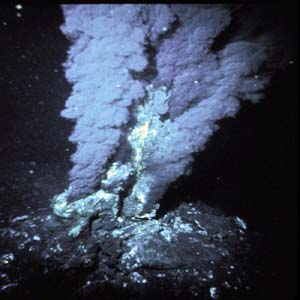It's Life, But Not as We Know it…Keene State Hosts Ridge 2000 Lecturer Melanie Holland

KEENE, N.H. 3/15/05 - Life, large and small, survives and thrives in our planet’s most inhospitable environments - even in “black smokers,” the vents of underwater volcanoes, in temperatures up to 230 degrees Fahrenheit.
Dr. Melanie Holland, a researcher in the Department of Geological Sciences at Arizona State University and a distinguished lecturer of the Ridge 2000 program, will speak about microorganisms that live in volcanoes and hot springs in lectures at Keene State College on Wednesday, March 30, and Thursday, March 31. Ridge 2000, which is funded by the National Science Foundation, is a research program to explore Earth’s ocean ridge system.
In her public lecture, “Seafloor Volcanoes, Surly Bison, and the Ecology of Life in Boiling Water,” on Wednesday, Holland will describe her research on thermophiles, heat-loving microbes, which has taken her from the sea floor to the hot springs (and unruly bison) of Yellowstone National Park. The lecture will be held at 7 p.m. in the Alumni Recital Hall of KSC’s Redfern Arts Center.
In her science community lecture, “The Mid-Ocean Ridge Subseafloor: Prime Microbial Real Estate” on Thursday, Dr, Holland will speak about research on microorganisms that live in deep-sea hydrothermal vents. Her study reveals insights about the range of habitats available in the oceanic crust and the physicochemical nature of preferred habitats. The lecture will be held at 4:30 p.m. in the Markem Lecture Hall (room 101) of the KSC Science Center.
Temperature is one of the few physical or chemical variables that has the capability to render an environment completely sterile, explains Dr. Holland, but our everyday experience concerning cooking, boiling, and sterility is somewhat misleading. In hot springs and other volcanic environments, heat- loving microbes specifically adapted to these high temperatures thrive. The implications of this research are considerable, Dr. Holland says. If microorganisms can live in habitats created solely by volcanoes, then volcanoes on other planets might also support life.
Both lectures are free. For more information, call Scott Strong, associate professor of biology, at 603-358-2093.





